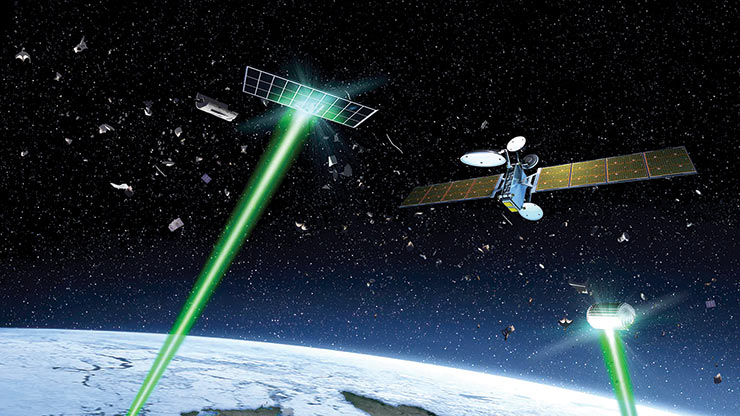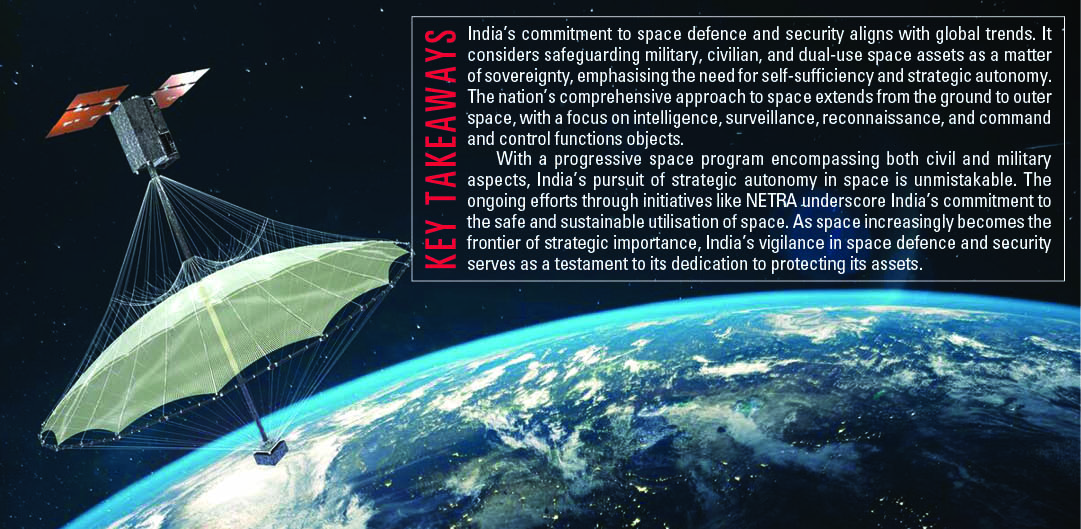
The escalating population of space objects, including operational satellites and orbital debris, along with the associated collision risks, threatens the safe and sustainable utilisation of outer space. The growing congestion in Earth’s orbits presents an impending danger of collisions, capable of initiating a self-sustaining cascade known as the Kessler Syndrome. This could significantly exacerbate the density of space debris, ultimately rendering outer space inaccessible for future generations.
Efficiently managing safe and sustainable operations in outer space necessitates a comprehensive approach that encompasses multiple facets including observation and monitoring of space objects and the space environment, development examination for the space environment, risk assessment, data exchange, and collaboration. A multi-domain awareness platform is instrumental in delivering timely, accurate, and efficient information concerning on-orbit collisions, fragmentation, atmospheric re-entry risks, cataloguing of observational data, hazardous asteroids, and space weather forecasts. The acquisition of precise orbital information from ground-based sensors is a prerequisite for mitigating collision threats to operational space assets from other objects.
India’s Stance on Space Defence and Security
India, in alignment with numerous other nations, has embarked on the journey of space defence and security. Given India’s progressive space program, safeguarding and defending space assets, encompassing military, civilian, and dual-use, assumes paramount importance. Deemed a matter of sovereignty, the primary objective is to maintain a substantial level of self-sufficiency to ensure strategic autonomy. India’s Defence Forces policy integrates operations across various domains, extending from the ground, through the air, to outer space. Space-oriented services, originating on Earth and extending up to the Geostationary Earth Orbit (GEO), involve units providing intelligence, surveillance, reconnaissance, and command and control functions.
India’s space program has been pivotal in fostering the nation’s development journey, with space-based assets playing a fundamental role in critical services such as weather monitoring, communications, resource management, and navigation.
India’s Dual-Vertical Space Capability
India’s space capability operates on dual verticals—civil and military. The Network for Space Object Tracking and Analysis (NETRA) program of the
is designed to support India’s independent space access and utilisation. NETRA facilitates the timely and precise transfer of data pertaining to the space environment, including threats to both in-orbit and ground infrastructure. A segment of the Space Domain Awareness (SDA) program, Space Surveillance and Tracking (SST), is dedicated to monitoring active and inactive satellites and space debris.
The Growing Relevance of SDA
With the continuous expansion of the space object population and the emergence of mega constellations, SDA has evolved into an integral and indispensable component of ensuring safe and sustainable space operations. For the past five decades, ISRO has actively conducted SDA activities with a primary focus on safeguarding India’s space assets.
Recognising the imperative of dedicated efforts to address the challenges posed by the increasingly congested and contested space domain, the Directorate of Space Situational Awareness and Management (DSSAM) has been established at ISRO. DSSAM is tasked with developing enhanced operational mechanisms for defending and protecting Indian space assets. This involves effective coordination among ISRO Centres, other space agencies, and international bodies, along with the establishment of essential supporting infrastructure, including additional observation facilities for space object monitoring and a centralised control centre. The NETRA project serves as the initial step toward achieving these objectives, featuring key components such as radar, an optical telescope facility, and a control centre.

Space Policy 2023: A Blueprint for the Future
Recently, the Government of India unveiled Space Policy 2023, representing a comprehensive, integrated, and dynamic framework to realise the reform vision. This policy aims to bolster space capabilities, foster a thriving commercial presence in space, reap benefits in allied domains, and create an ecosystem for operational space applications involving all stakeholders. Consequently, SDA assumes an increasingly prominent role, cementing its status as an indispensable element in India’s pursuit of excellence in space endeavours.
SDA Warfare: Information Dominance in Space
SDA warfare encompasses a series of strategies through which the space actor seeks to achieve information dominance in the space domain. This form of warfare revolves around three key principles:
(a) Maintaining the accuracy of one’s own SDA information.
(b) Degrading the accuracy of the adversary’s SDA information.
(c) Avoiding collateral threats.
Actions in SDA warfare that result in a permanent degradation of overall SDA capability can lead to reduced accuracy in the catalogue of space objects. Consequently, commercial satellite operators may have less confidence in verifying cautionary messages, potentially increasing the risk of inadvertent collisions. Given the multitude of applications that satellites support, any reduction in capability, such as in navigation, communications, and meteorology, could result in the loss of civilian lives outside the theatre of operations, a violation of international laws of armed conflict.
Challenges in SDA Dominance
A significant challenge related to achieving SDA dominance is the geographic location of sensors. Information regarding the locations of tracking networks, especially those of powerful space nations like the United States, is not difficult for adversaries to obtain. This knowledge can be exploited to predict when their satellites are likely to be under surveillance.
The Path Forward
NATO’s declaration of space as an operational domain has prompted initial steps toward enhancing cooperation, collaboration, and coordination among member states and their space capabilities. As SDA is a global domain with autonomous elements, it is imperative to respect the interests and prerogatives of nations in maintaining operational command and control of their space assets.
The development of new tactics, techniques, and procedures for space is steadily progressing toward enhancing upstream, mid-stream, and downstream capabilities for space operations. However, the successful implementation of these advancements depends on various factors, including the modernisation of outdated hardware and software. Integration, rather than mere coordination, is poised to set the highest standards for advancing space security, sustainability, and resilience. However, the challenge lies in how this level of integration can be effectively realised.
–The writer is a serving Indian Army Officer with a diverse academic background, including degrees in Law, Air & Space Law, an MBA, and ongoing Ph.D. studies in Space Economy & Legislation. Trained at prestigious scientific institutions, he is recognised for contributing articles on specialised strategic subjects and as a speaker at seminars and military institutions in India. The views expressed are of the writer and do not necessarily reflect the views of Raksha Anirveda















